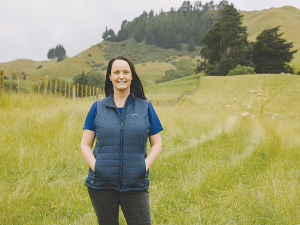Another Windfall for Fonterra Farmers, Unit Holders
Fonterra farmer shareholders and unit holders are in line for another payment in April.
 Rabobank analyst Emma Higgins says farm costs right across the sector remain high while prices for primary exports have dropped.
Rabobank analyst Emma Higgins says farm costs right across the sector remain high while prices for primary exports have dropped.
A little bit more darkness is expected before dawn starts to emerge.
That’s the warning from Rabobank’s agricultural analyst Emma Higgins as Fonterra dropped its forecast farmgate milk price from $8.00/kgMS to $7.00/kgMS. She says this follows another weak GDT auction, which saw dairy commodity prices fall below five-year averages.
This also comes at a time when on farm costs right across the primary sector remain high and prices for other primary exports have dropped. In its latest commodity outlook report, Rabobank says lamb prices continued to fall through July and are now approaching a five-year low. At the same time, the beef schedule has taken a hit and global dairy prices are also falling.
Lamb prices fell by 7% in July alone, which is contrary to what would normally happen. While the normal seasonal contraction in the supply of lambs in August and September may see prices come back a bit, the bank’s view is that weaker global prices and strong competition will likely mean that prices for lamb will be soft in the coming months.
The outlook for beef is not great either, with some strong competition from Australian beef exports that has been dampening NZ prices – a trend which may continue.
While export returns are less than favourable to NZ, there looms another problem: costs and inflation with overall on farm costs have risen by 13%.
Dairy's Decline
This decline in the dairy sector was predicted several months ago in MPI’s June Situation and Outlook report.
Higgins says costs in the dairy sector have lifted 13% year-on-year, with the biggest hit coming from interest rates, which are up by 50% year-on-year. Meanwhile, fertiliser and general dairy shed expenses are up by 11% and insurance premiums are also up 9%.
But Higgins says the pain is not spread evenly across the sector. She says those farmers who have a lower cost structure have a competitive advantage – as do farmers who have lower farm expenses and higher debt.
She adds that those with low debt and high expenses are also faring okay. However, Higgins says there are a portion of farmers with high costs who are highly leveraged and are feeling the pressure.
“The fall is largely down to lower import demand from China which is currently working through a wave of milk – a surge that has been growing for some years,” she told Rural News.
“Production growth is slowing down – which is what we need to see for markets to rebalance – but the rate of growth for the first half of 2023 has exceeded our expectations. Milk supply growth was 7.5% YOY in the first half of 2023, with a slowdown in Q2 vs. Q1.”
However, Higgins says while markets are weak and times are very challenging, Rabobank does not see the present situation as a ‘super cycle’ downturn.
She points to the 2014/15/16 downturn, when the milk price plummeted from $8.40/kgMS (2013/14) to $4.40/ kgMS (2014/15). She says if we adjust for inflation, that’s like a milk price in today’s terms sinking from almost $10.60/kgMS to $5.50/kgMS.
Higgins says the triggers for a rebalance of the milk situation within China are in play, with milk prices falling, cost pressures rising and farm expansion slowing.
Global trade has been thrown into another bout of uncertainty following the overnight ruling by US Supreme Court, striking down President Donald Trump's decision to impose additional tariffs on trading partners.
Controls on the movement of fruit and vegetables in the Auckland suburb of Mt Roskill have been lifted.
Fonterra farmer shareholders and unit holders are in line for another payment in April.
Farmers are being encouraged to take a closer look at the refrigerants running inside their on-farm systems, as international and domestic pressure continues to build on high global warming potential (GWP) 400-series refrigerants.
As expected, Fonterra has lifted its 2025-26 forecast farmgate milk price mid-point to $9.50/kgMS.
Bovonic says a return on investment study has found its automated mastitis detection technology, QuadSense, is delivering financial, labour, and animal-health benefits on New Zealand dairy farms worth an estimated $29,547 per season.

OPINION: Here w go: the election date is set for November 7 and the politicians are out of the gate…
OPINION: ECan data was released a few days ago showing Canterbury farmers have made “giant strides on environmental performance”.